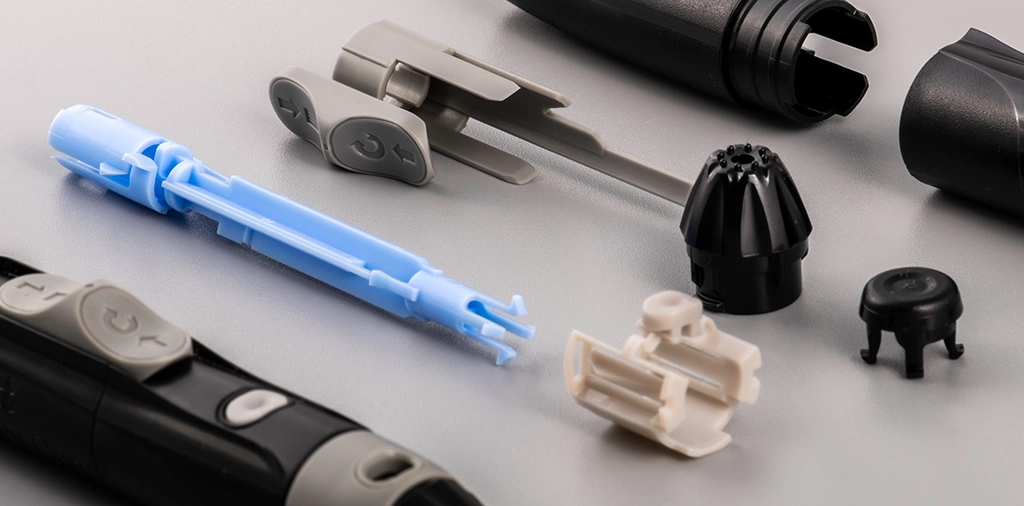Material selection is a key area for the manufacturing of medical devices. From surgical tools and drug delivery systems to implantables and prosthetics, the materials used for parts can have a significant impact on the final product’s safety, accuracy and lifespan, as well as compliance.
Medical devices need to be durable and able to resist general abrasion, as well as sudden shocks. They equally need to be easily cleanable and frequently sterilisable and chemically resistant, as well as being cost-effective.
The unique and demanding requirements of medical devices has traditionally led to a reliance on metals in manufacturing medical components due to their high strength, durability and biocompatibility. However, due to innovation in medical manufacturing, there is a growing shift towards plastic injection moulding for medical devices.
Polymers embody several useful properties that make them well suited to medical devices. Not only can they share the same durability, impact resistance and bacteria resistance properties as metals, they can also be cost-effective and lightweight.
It is for this reason that a wide range of polymers are used in medical products.. At OGM, for example, we use a range of medical plastic components in manufacturing implants, procedure testing kits, dental equipment and surgical equipment.
Here, we’ll dive deeper into some of the key advantages of using modern and advanced plastics in medical device manufacturing versus metals.
#1 – Plastics are lightweight and ergonomic
Plastics can be significantly lighter in weight than metals. This is why it is a perfect material to use in portable medical instruments and surgical tools. Plastic surgical implements, for instance, enable surgeons to go about lengthy procedures with less fatigue and more precision, for example.
Plastics also facilitate good ergonomics. If it is a handheld diagnostic tool or a wearable medical device, it is easy to obtain user-friendly shapes and contours because of the flexible nature of some plastics during use. This means a more comfortable and practical experience for both patients and practitioners.
#2 – They are more cost-effective in high-volume production
One of the biggest advantages of medical plastic components over metals is the cost-efficiencies they provide at scale.
The use of plastic injection moulding for medical devices has been transformative. Once a mould has been created, it can be used to produce hundreds of thousands of identical parts – repeatability that significantly drives down per-part costs, making plastics a good choice for high-volume production.
#3 – Plastics offer superior design flexibility
Medical device injection moulding isn’t restricted to the creation of simple components either. Indeed, healthcare injection moulding can be used to shape plastics into highly complex, intricate geometries that would otherwise be difficult and prohibitively expensive to achieve at scale.
Take syringe parts for example. These are devices used at scale every day in healthcare systems around the world, yet the barrel, flange, plunger and needle hub are all individually small, intricate components that need to be designed to highly precise measurements for the overall syringe to work effectively. For products and components such as this, medical device injection moulding has become a game changer.
#4 – Medical-grade polymers ensure biocompatibility and safety
Biocompatibility is a further consideration in the production of medical equipment designed for direct contact with the body. In this respect, many medical grade plastics are able to demonstrate safe and stable performance in clinical environments.
Polyethylene (PE) is one such example. This polymer serves multiple functions because it shows versatility with its low moisture absorption capabilities along with high chemical resistance and structural strength while also being porous and biocompatible for implant and catheter production.
#5 – They can withstand rigorous sterilisation processes while resisting corrosion
Alongside biocompatibility, medical devices must stand up to repeated sterilisation cycles without degradation. Many plastics are again well suited to this due to their excellent resistance to the high temperatures and harsh chemicals typically used in cleaning and disinfection.
Here polyetherimide (PEI) is a particularly good options owing to their leading dimensional stability.
#6 – Plastics deliver electrical and radiation resistance
Where scans, X-rays or other diagnostics procedures are concerned, material selection is vital when it comes to medical device manufacturing. Specifically, it is imperative that materials in implantable devices and peripheral equipment are compatible with and can withstand scan environments such as strong statis magnetic fields.
While metals pose significant challenges in MRI and CT scans such as safety risks and distorted images, many polymers don’t. Indeed, advanced polymers can be enhanced with specialist coatings to shield against electromagnetic and radio frequency interference.
Making the right material choice for modern medical devices
While metals had long been the obvious choice in medical devices, plastics are increasingly proving their value across a broad range of healthcare devices. Their light weight, low cost, design flexibility, biocompatibility, sterilisation compatibility and electrical and radiation resistance make them an attractive option in many applications.
It’s all about the appropriate material for the application. As the availability of medically polymers continues to grow, manufacturers have never had such a wealth of choice in meeting performance, safety and regulatory demands.
For medical manufacturers who are new to the advantages of plastics, working with an injection moulding specialist is an important first step.
With deep expertise in medical-grade polymers and validated production processes, OGM is an expert in the delivery of high-quality, repeatable components that meet the stringent demands of the medical industry. We work with a wide range of advanced plastics and can advise on medical grade materials that meet your product specifications.
Interested in leveraging the benefits that medical plastic components provide? Contact us to see how our medical device injection moulding could help you enhance your medical device innovations.

